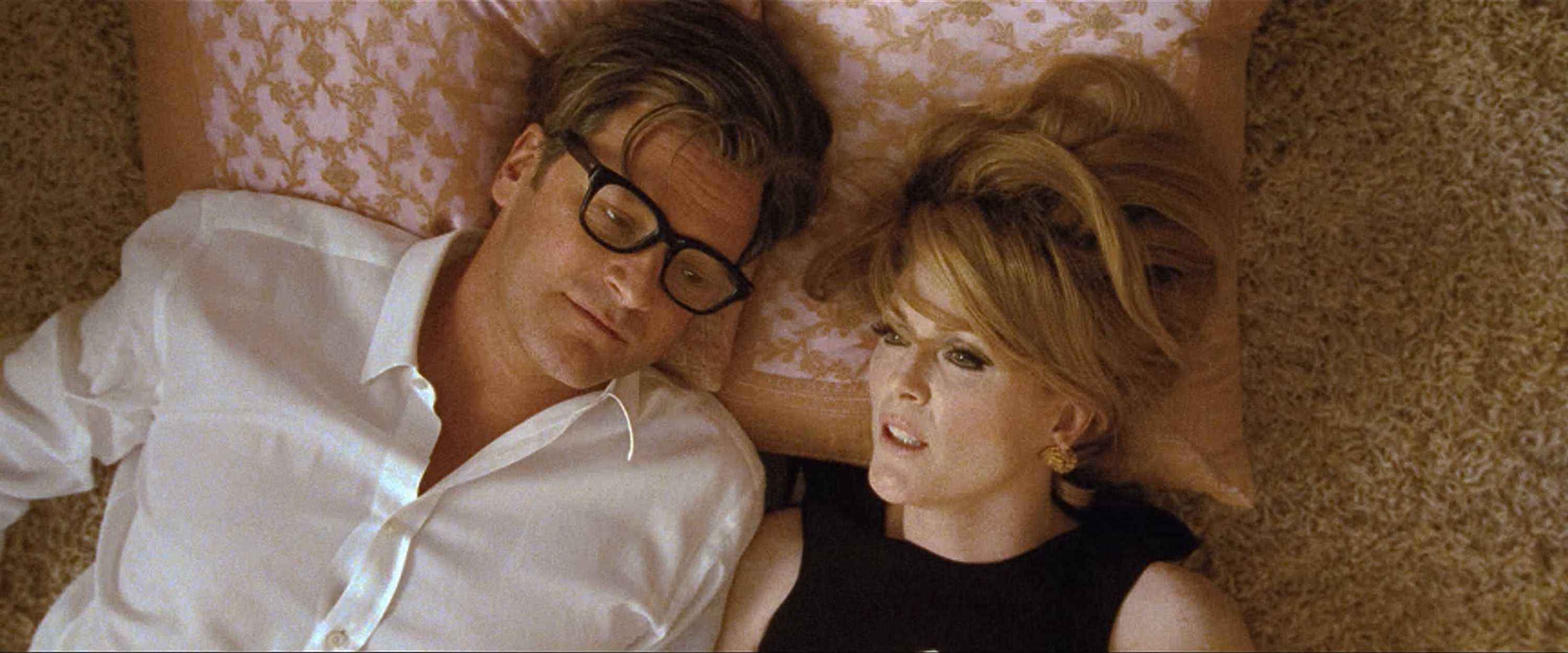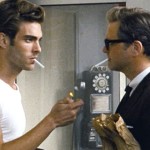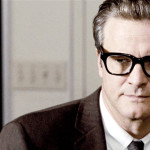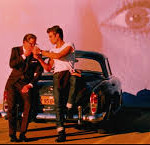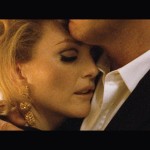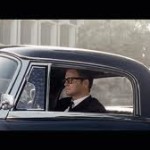This is a slow-burn movie that focuses on all that is good about the medium of cinema. And it demonstrates entirely my theory that the movie for which an actor is awarded an Oscar is rarely their best performance, since, with all due respect to Colin Firth‘s award-winning outing in the popular The King’s Speech, his performance in the far less commercial A Single Man is of greater stature by head and shoulders, and the breakthrough moment when Firth put to bed the stereotype of his earlier movies in order to be considered a heavyweight, much as Tom Hanks achieved with two Oscars.
Don’t get me wrong, TKS is a very competent and accomplished performance, handled with dignity and overcoming a number of tricky technical hurdles, but ASM is a different league in the serious acting stakes. Here Firth portrays Professor George Falconer, a gay man in America in 1962 at the time of the Cuban Missile Crisis and the growing civil rights movement. Falconer is desolate since the death of his partner and is not merely contemplating suicide but planning it in every last detail. The final irony of the story I will not reveal, but it is worth waiting for.
Almost none of Falconer’s true feelings are vocalised, he shields all inner emotion, even from his closest friend, the drunken and equally depressive Charley (Julianne Moore in trashy mode, wanting to resume a brief dalliance with George and not understanding his true love for Jim); yet his communication with the audience is beautifully measured. It is one of those rare performances where you get no notion of the actor acting the part, only the character facing up to a personal crisis and in the course of so doing remembering the things that made life worth living. Apart from one occasion, he needs no histrionics, melodrama or over-acting, which is entirely apt for the character and the movie. It is all the more moving for being understated, a lesson many actors and directors would do well to note.
The movie is Tom Ford‘s low key but multi-faceted interpretation of Christopher Isherwood‘s novel, and a fine job he makes of it. As you would expect with a fashion creative consultant directing his debut movie, the look and feel is totally authentic for 1962 California. Ford’s camera takes in all the lavish and beautifully realised detail with a long, slow lens. He gives each actor in turn a chance to shine, develop their respective characters and to focus on contributing to a forensic analysis of why Falconer is how he is.
Given that the story progresses over one day, albeit with a few flashbacks, character development is subtle and picks out the ambiguities. For all the fact that he was dedicated to his partner, Jim (Matthew Goode) and resolved that life without Jim is not worth living, he cannot help but be attracted to a Spanish model (Jon Kortajarena) and a student (Nicholas Hoult, far come a long way from the teenage lothario he played in Skins) in turn. The homoeroticism with which each younger man is displayed speaks for the side of Falconer that is tempted to indulge in sexual gratification without emotional ties, but out of loyalty to Jim he resists: look but don’t touch! Nonetheless, it brings back memories of the passion and desire of his initial encounter with Jim, preserved as the metaphorical beacon.
In one sense this is a movie about a man dealing with grief, though it is equally a story of its time. One weakness is that many of Falconer’s friends and colleagues know about his sexuality, but the attitudes demonstrate no hint of homophobia at a time when open same sex relationships were not only taboo but may have resulted in violence. I don’t think Ford needed to amend the poetic ambience of his movie to have accommodated a hint of those real world attitudes, even as an aside.
This did not deter the critics, who were highly positive about a movie which would have proved controversial within living memory:
The film has received an overall positive reception from critics, with most reviews singling out Colin Firth’s performance. It currently holds an 85% “Fresh” rating on Rotten Tomatoes, based on 175 reviews, with the site’s consensus being that “Though the costumes are beautiful and the art direction impeccable, what stands out most from this debut by fashion designer Tom Ford is the leading performance by Colin Firth.” Metacritic has compiled an average score of 77 (generally favorable reviews) from 35 critic reviews.
Critics who liked the film include The A. V. Club film critic Nathan Rabin, who gave the film an A- score, arguing that “A Single Man is a film of tremendous style wedded to real substance, and rooted in “Firth’s affecting lead performance as a man trying to keep it together for one last day after his world has fallen apart.” Critic Roger Ebert from the Chicago Sun-Times also praised Firth, saying that he “plays George superbly, as a man who prepares a face to meet the faces that he meets. He betrays very little emotion, and certainly his thoughts cannot be read in his eyes.”
The Times newspaper of London called the film “a thing of heart-stopping beauty . . . There will be critics who will be unable to get past the director’s background, but rest assured: Tom Ford is the real deal.” Variety‘s verdict: “Luminous and treasurable, despite its imperfections. An impressive helming debut for fashion designer Tom Ford.”
So then, a very fine debut for Ford and a lifetime achievement for Firth. Congratulations to both, and I hope they both choose their next projects with care and no little gravitas.

